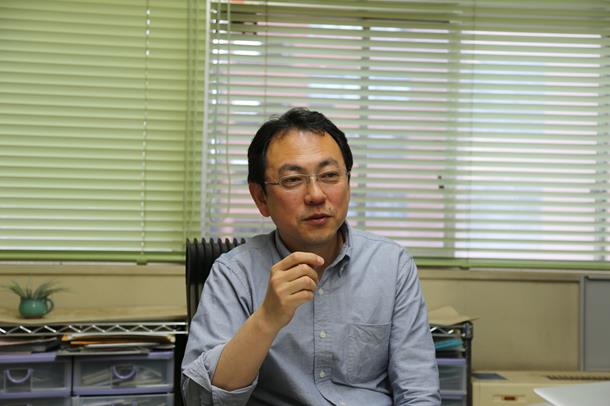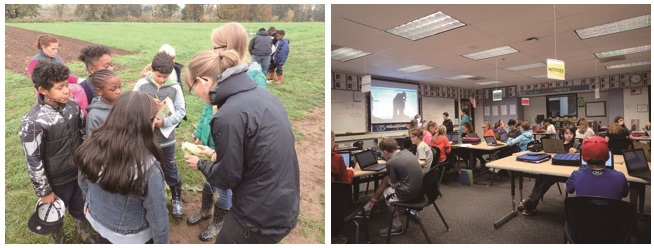TSUKUBA FUTURE
#062 Building Networks to Promote Social Participation through Service-Learning
Associate Professor KARAKI Kiyoshi, Faculty of Human Sciences

With the extension of voting rights in Japan to 18-year-olds, there is sudden talk of educating young people about civic rights and obligations to encourage them to vote and participate in the political process. Following WWII, the educational subject of social studies was introduced to develop in students the aptitudes and abilities needed to be an upstanding member of democratic society. Education on the rights and duties of citizens came under the topic of civics. Prof. Karaki has been investigating social studies education from elementary school through to the university level in order to establish methods by which young people exert their power to give back to society.
In Japan, society-related educational subjects are taught in elementary school and junior high school as part of social studies, and in high school under either history and geography or civics. The overall aim in teaching these subjects is to get elementary, junior high, and high school students to take an interest in the many things going on in society, and to think of ways to deal with social issues. The aim is, in other words, to nurture civic interest.
Since the introduction in Japan of voting rights for 18-year-olds, people have turned their attention to the topic of educating young people about their rights and duties as citizens, but for a young person about to turn 18, when they suddenly become a voter, it all may be quite overwhelming. Prof. Karaki considers it important to introduce civic education starting with elementary school to open the eyes of children to the society in which they live.
Is it too early for elementary school children to study civics? Absolutely not. Civic education is not just the study of politics; it involves how we interact with the world as members of society. One example of this type of education would be to take a field trip to a garbage incineration plant or water purification plant to learn how the society in which we live functions. By visiting locations where garbage is sorted or recycled, elementary school children can gain a greater awareness of larger social issues through something they have hands-on experience with. Then, as they go on to junior high school and high school, they may develop an interest in issues related to energy and the environment, and even develop the desire to participate in politics or the election process.
In fact, in some classes such as home economics and Japanese language, teaching materials cover consumer education, human rights, and other topics related to civic education. Elementary school is actually quite well suited to the introduction of civic education as it is easy to create lessons that go well together with other subjects. Prof. Karaki's research theme is designing systematic curricula for social studies at each level of education.
Voting in an election, volunteering in a disaster zone, and picking up trash with one's neighborhood association are all forms of social participation. Those activities are an extension of civic education. But the desire to participate in society does not germinate overnight. Education must therefore be provided over an extended period of time.
One might then ask what kind of education is the most effective? Prof. Karaki spent one year at Portland State University in 2015 doing a field study of the unique educational curriculum of "service-learning," which incorporates community support activities. Portland, in the state of Oregon, is a city with a population of 600,000 that is known worldwide for its citizens' autonomous social action. It is also famous for its promotion of "slow living."

Speaking passionately about how the official introduction of service-learning can be a major strength at the University of Tsukuba.
Service-learning is a compulsory six-credit course at Portland State University. A significant feature of the course is that it is taken by seniors who are about to graduate. It is designed to be a culminating opportunity for university students to test how useful their specialized knowledge and skills are in the real world. Students from different specialized fields form teams, and with the cooperation of local NPOs plan what activities they will engage in by pooling their ideas and discussing them together. Then they go out into the local community and put the plan into practice.
This kind of curriculum could only have become possible with an awareness of social participation cultivated through education since elementary school. The program also requires competence on the part of instructors who must build the networks inside and outside the university that support the class. They must provide appropriate assessments and guidance while the activities are ongoing and in classes set up for reflection afterwards. In Japan there has been some movement toward giving university credit for volunteering and other community-based activities, but most programs are positioned as general studies courses to be taken prior to deciding on a specialization. The focus on learning through real-world experience is where the Portland State University course takes a significantly divergent approach.
When Prof. Karaki himself was just going on to university, his dream was to teach social studies at the elementary school level. When he saw how children at that age are able to soak up so much new knowledge, he fell in love with the job of helping children to expand their horizons, and he still adores it. At university he came into contact with many young people who were involved in volunteering and helping local communities, and he felt their energy and drive to create a better society. If only there were some kind of educational opportunity that could harness that energy, he felt, it would be possible to naturally develop the ability to create a society of one's choosing without the need to stress the importance of social participation.
He wants to make "the study of society" a more interesting subject as a means of educating young people to be citizens. Service-learning, adapted for Japanese society, seems to be the key. Prof. Karaki has a plan that reaches from elementary school to university, extending beyond the framework of traditional schooling.

Service-learning education in action in the United States.
Left: University students explain environmentally friendly agriculture to elementary school children. They will return to their university class and reflect on their efforts.
Right: Junior high school students have a group study session on how to relieve school bus traffic congestion. Outcomes from the study program are expected to be submitted to the local board of education.
Article by Science Communicator at the Office of Public Relations


